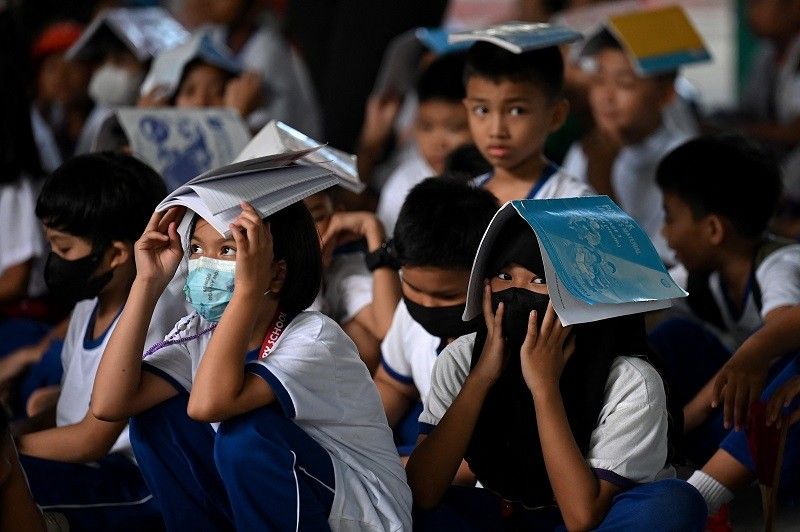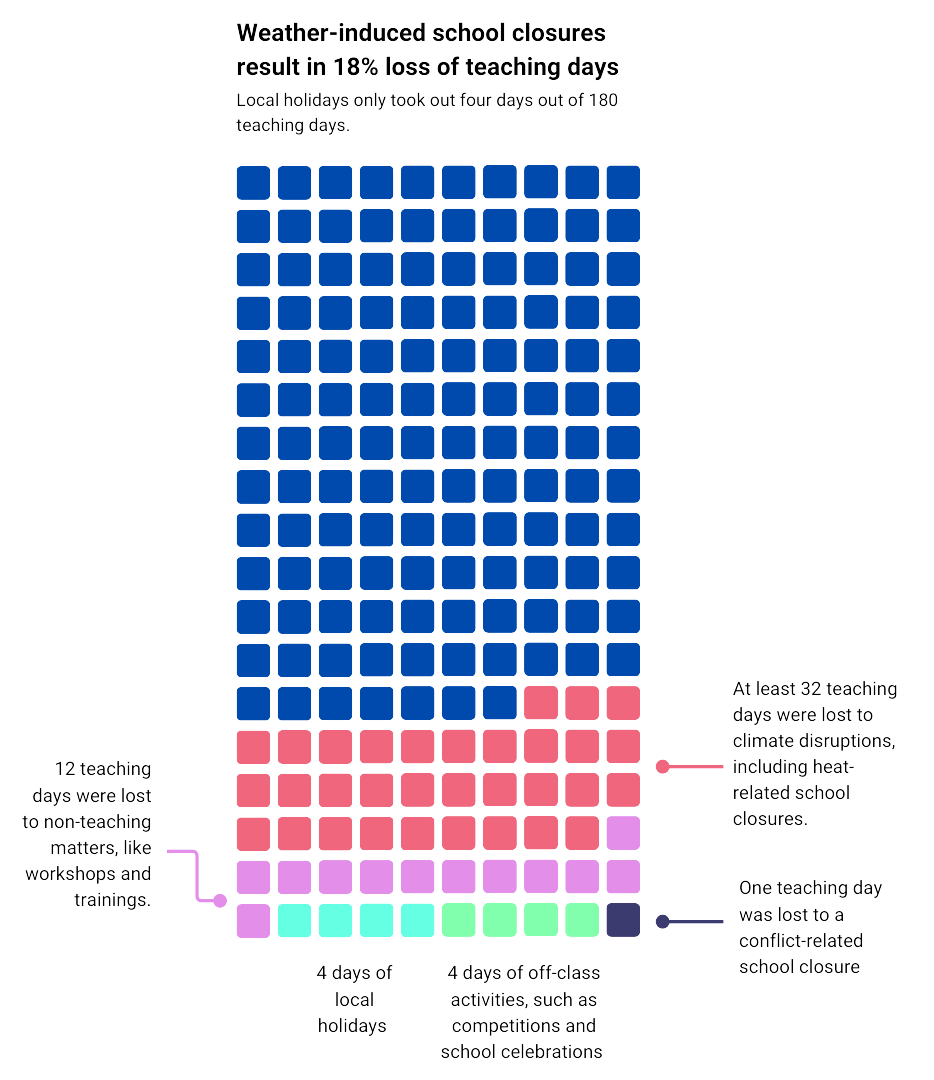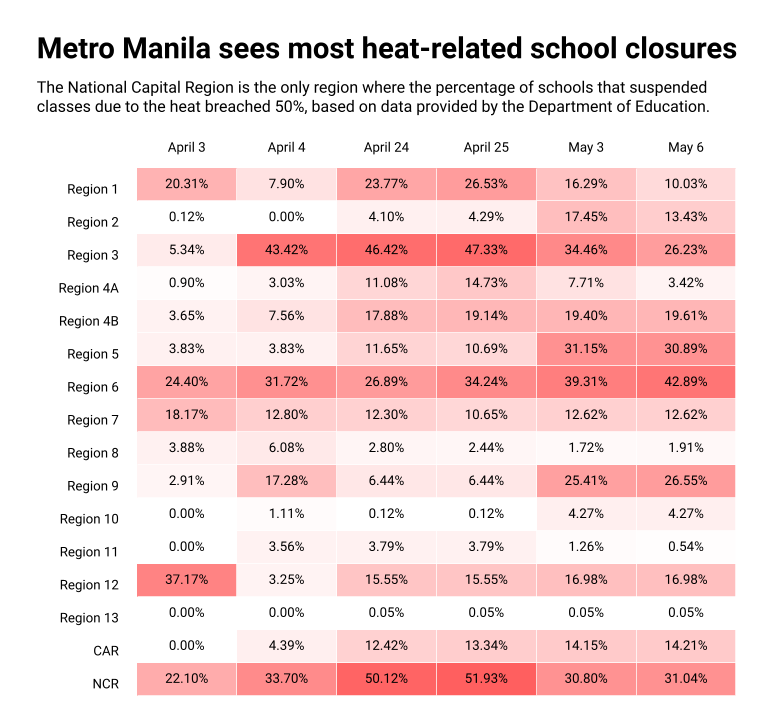The cost of climate disruptions: Philippines loses 32 teaching days to extreme weather

MANILA, Philippines (UPDATED June 25, 2024 4:06 p.m.) — Anyone could see that special education teacher Ronnel Jolejole-Aurel adored all ten of his students equally, but like any educator will tell you, there are stand-outs in every class.
For the teacher from Northern Samar, that unforgettable student was a nine-year-old child with mild Autism who could not speak, write, or communicate except through ear-splitting cries, but who handed him a rare win inside the classroom.
Throughout the school year, with Jolejole-Aurel's help, the student's tantrums had softened into quiet, non-verbal requests to be held by his teacher instead. After days of practicing holding objects, the student finally learned to hold a pen, leading Jolejole-Aurel to believe it was time to teach the alphabet.
But the teacher's hopes were quickly dashed. Several heat-related class suspensions in the last months of the school year, combined with difficulties with remote learning, erased the progress made by the nine-year-old student, Jolejole-Aurel said. The suspensions had, in his words, forced a "back to zero" for his class.
"Class suspensions really affect the learning of my [learners with special needs] class, because they have a short span of memory. That is why we need to repeat our lessons everyday [before] proceeding to the next lesson," Jolejole-Aurel told Philstar.com.
"Ngayon, lahat kinalimutan na (Now, they forgot everything)," said the teacher from Las Navas I Central School, a school from the division of Northern Samar.
Jolejole-Aurel’s students are among the millions of students across the Philippines who, on average, lost a third of in-person classes last school year mainly due to climate-induced school closures and non-teaching events, among others. The time lost is believed to set back the Department of Education’s efforts to recover learning losses from the pandemic and improve the Philippines’ standing in international assessments.
RELATED: 'Stagnating at the bottom': Officials say time and funding needed to improve PISA scores
At least 53 out of 180 days, or three months' worth of teaching time, was lost from class suspensions caused mainly by weather disruptions and teachers’ non-teaching tasks, based on a new analysis by state think Philippine Institute for Development Studies (PIDS) in a June 19 news release by the Second Congressional Commission on Education.
Schools across the country lost 32 teaching days due to the high heat index from April to May, on top of other calamities, the PIDS study's preliminary findings found. At least 12 days of teaching time was lost from non-teaching tasks, while other factors, such as local holidays, conflict and off-campus activities, took out nine days.

Record-breaking heat driven by climate change had led to “practically no face-to-face classes in April-May," but these should be interpreted as estimates as these still need to be weighed with the actual day-to-day data, said Mike Abrigo, PIDS senior fellow.
Meanwhile, EDCOM 2 Executive Director Karol Yee noted that even if the department decongests the curriculum, the shorter school year from the loss of actual teaching days means that there is “limited time to absorb the lessons.”
Abrupt pivot to distance learning
Some regions had it worse than others. Based on Philstar.com’s analysis of data provided by the DepEd to reporters, at the peak of heat-induced class suspensions on April 24, half or at least 50% of all schools in the National Capital Region (NCR) canceled in-person classes, while nearly half or 46% of schools in Region 3 did the same.

For Region 6, no less than a quarter of all schools suspended in-person classes throughout the period covered by the data. At its peak, at least 43% of all schools in Region 6 suspended face-to-face classes.
(Note: DepEd provided reporters with the total number of schools who suspended in-person classes only for April 3, 4, 24, 25, and May 3 and 6. Philstar.com has reached out to DepEd to ask for data covering all of April and May and will update this story with its response.)
With face-to-face classes suspended, teachers found themselves back to depending on learning modules to assess if their students were still learning at home.
Gemma Soneja, an Araling Panlipunan teacher at a public high school in Marikina City in NCR, said that she had to cancel a long-awaited immersion activity for her students after the scorching heat forced her school to switch to distance learning for the entire last quarter of the school year.
“Project based sana ang balak ko na performance task ng hawak kong science section kasi civic education ang fourth quarter. As in, i-immerse ko sana sa barangay. Buo sila [sa] proposal, kaso pangarap ko na lang pala yun,” she said.
(I was planning to have a project-based performance task for the science section I handle since the fourth quarter is about civic education. I wanted to immerse them in a community. They were supposed to create a proposal, but it seems that is just a dream now.)
Because of the abrupt shift to distance learning, Soneja said that the school was not able to map out students who preferred online or modular learning in time, similar to the survey done during the COVID-19 pandemic.
“I had to fail one student who never submitted anything,” she said.
Worse off than others
The heat took an even greater toll on students with special needs that made in-person instruction impossible.
Jolejole-Aurel noted that the heat is typically more unbearable for students with special needs, as some have disabilities that make them more sensitive to high temperatures in the classroom.
This was also the finding by Jonas Bull, disability rights researcher for Human Rights Watch, who said in a 2023 article that some people with disabilities fail to cope with the heat because of difficulties regulating their body temperature, highlighting the need for governments to make its responses to heat waves more inclusive.
“Just one wall fan and one stand fan is not conducive for learning inside a hot classroom,” said Jolejole-Aurel.
“[Nandiyan] yung madali silang [ma-bore] sa kinauupuan nila, maya-maya tatayo lalakad. Kumbaga yung kanilang katawan hindi agad makapag-adjust sa atmosphere na mayroon sa classroom. Lalo na dito sa place namin na panay brown out,” he added.
(They are the type who can't sit still for long; after a while, they will stand up and walk around. In other words, their bodies can't easily adjust to the atmosphere in the classroom. Especially here in our place, where we frequently experience power outages.)
The special education teacher said that students in his class needed to be in his presence so he could supervise each student's lesson as they all had unique needs. “With modules, you’re not sure if they are even the ones still answering it, or if they understand the lessons,” he added.
The teacher acknowledged, however, that there is “nothing we can do” if the heat index spikes to a level that requires students to be sent home.
What Jolejole-Aurel and his co-teachers did instead was hand out answer sheets for students to take home – which was no substitute for the daily pen-holding practices he was able to give his nine-year-old student with autism.
Looking back, the special education teacher said that the heat-induced class suspensions “really took a lot of time." However, he said that he now needed to prepare for the upcoming typhoon season, as Northern Samar typically experiences flooding.
This school year opens on July 29 — marking an earlier date as part of DepEd's phased return to the traditional academic calendar that runs from June to March.
However, climate advocates like Zyoen Garcia of the Stewards and Volunteers for the Earth Philippines (SAVE Philippines) have earlier warned DepEd that despite moving the start of classes to June, extreme weather events pose a year-round threat and students and teachers will still be exposed to strong super typhoons.
RELATED: Climate advocates tell DepEd: Time to solarize schools amid warming world
Jolejole-Aurel said that he hoped that no typhoon would directly hit his school this year. But in the meantime, he said he will still print plenty of activity sheets in advance and plan home visitations for his students.
“Still I stand tall, for what else I can do for the betterment of my class?” he added.
- Latest
- Trending


























